Cebuanos tell ADB
to cease funding coal, dirty energy
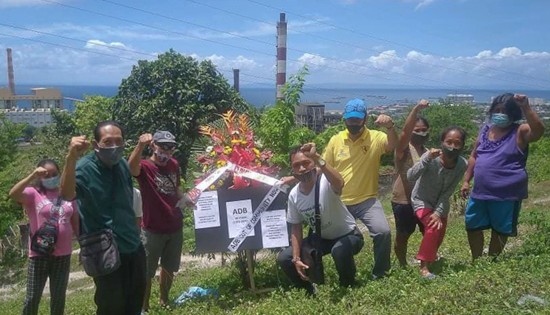
Press Release
May 4, 2021
QUEZON CITY – The
Power for People Coalition (P4P) and residents of Naga City, Cebu on
Monday demanded a clear commitment from the Asian Development Bank (ADB)
to end its financial support for coal and other dirty energy
projects in the Philippines and Asia through a symbolic action at
the site of the ADB-funded Naga coal plant in Cebu.
The action was held as the
Bank starts its 3-day Annual Meeting, as statement that the impacts
of the coal power and other dirty energy projects must be a
top-of-mind matter in the evaluation and updating of ADB's 2009
Energy Policy and investment decisions.
"For over a decade, ADB
allowed itself to believe that its supposedly 'clean energy' agenda
propelled it towards leadership in sustainability while helping
achieve energy security in its member countries. That is far from
the reality experienced by communities affected by ADB's coal
projects," said Teody Navea, Coordinator of Philippine Movement for
Climate Justice (PMCJ) Cebu. PMCJ is a convenor of P4P.
Inaugurated in 2011 and
currently managed by Korean Electric Power Corporation-Salcon Power
Corporation (KSPC), the 200 MW Naga coal power plant is ADB's first
coal power generation project under its 2009 Energy Policy and was
touted by the Bank as adopting “a more environment-friendly
technology by using circulating fluidized bed (CFB) combustion
boilers". Upon entering operation, the plant was subjected to
complaints from community members and concerned groups for heavy
pollution and noncompliance in social acceptability and public
communication requirements.
"As the Bank's executives
attend their Annual Meeting in the comfort of their homes and
offices, we gather here today to let them know of our health and
livelihood problems, environmental degradation, vulnerability to
climate disasters, and a constant fear for the welfare of future
generations of our people," Navea said.
The groups led a symbolic
wreath-laying activity featuring a 'tombstone' detailing destructive
impacts of ADB's Naga coal plant to community members.
"We live next to a coal
facility that is taking us nearer to our demise with each day it
burns coal and emits toxins into our air, land and water. We know
the same is being experienced by other Filipino communities. It is
in solidarity with them that we urge ADB to lay to rest its dirty
energy legacy and bury its support to coal and other fossil fuels in
the past, so that communities like ours would no longer need to bury
loved ones led to their early deaths by dirty energy," said
Dominador Basaya of the Naga Neighborhood Association.
ADB is expected to
publicize a draft of its updated energy policy around the time of
its Annual Meeting.
"In this Annual Meeting
and its new energy policies, we hope the Bank chooses to initiate
projects that would help communities like ours access clean and
affordable renewable energy sources, of which we know our country is
rich in," Basaya said.
Last week, P4P including
several groups and community organizations from Cebu, submitted to
the Bank a joint Philippine civil society statement urging ADB to
end its dirty energy legacy and align to the 1.5°C Paris ambition.
"ADB’s Energy Policy is
severely outdated in the context of the global energy transformation
and the climate emergency, the deadliest manifestations of which are
already being experienced in our country....ADB is about to make a
critical decision that will define its role in global energy
transformation and addressing the climate emergency. We urge it to
choose to finally end financing for coal and other dirty energy
projects, and set the standard among all other development banks in
climate and sustainable finance leadership," the statement read.
Canadian
Parliamentary hearing on the human rights situation in the
Philippines
By
ICHRP-Canada
May 4, 2021
MANILA – The
Canadian House of Commons Subcommittee on International Human Rights
conducted a hearing on the human rights crisis in the Philippines on
Tuesday, May 4, 7:30 - 8:30 P.M. EST. The hearing was conducted
amidst growing calls to the Canadian government to end its policy of
quiet diplomacy in the Philippines and fulfill its commitment to
human rights.
 Following the Bloody
Sunday massacre in the Southern Tagalog region on March 7, 2021,
where 9 activists, human rights defenders, and community organizers
were killed in a coordinated police operation, 65 Canadian
organizations, including churches, trade unions, and Filipino
associations, and prominent individuals signed a joint letter to
Prime Minister Justin Trudeau expressing profound concern about the
deteriorating human rights situation in the Philippines and Canada’s
deafening silence.
Following the Bloody
Sunday massacre in the Southern Tagalog region on March 7, 2021,
where 9 activists, human rights defenders, and community organizers
were killed in a coordinated police operation, 65 Canadian
organizations, including churches, trade unions, and Filipino
associations, and prominent individuals signed a joint letter to
Prime Minister Justin Trudeau expressing profound concern about the
deteriorating human rights situation in the Philippines and Canada’s
deafening silence.
The Subcommittee invited
journalist Maria Ressa, one of Time Magazine 2018 Persons of the
Year, and Cristina Palabay, Secretary General of Karapatan
Philippines, a national network of human rights organizations, to
testify at the hearing. Quebec lawyer and co-chair of International
Coalition on Human Rights in the Philippines - Quebec, Guy-Lin
Beaudoin and Catherine Coumans of MiningWatch Canada, also
testified.
In her testimony, Ms.
Palabay underscored the urgency of the human rights crisis in the
Philippines. “It has become even more dangerous every day for human
rights defenders and ordinary citizens, with an epidemic of rights
violations in the Philippines.” Fifteen human rights workers of
Karapatan were among the 394 civilians killed “in the course of the
Duterte government’s counterinsurgency campaign.”
Even in the run-up to the
Canadian Parliamentary hearing, there had been no letup in the
military and police deadly campaign of terror.
On April 25, 2021, a local
government official, Froilan Saez Oaferina III, in Camarines Sur,
was killed after about 30 members of the Philippine National Police
went to his home to allegedly serve a search warrant.
On April 27, police
officers appeared at the office of the United Church of Christ in
the Philippines Southern Mindanao District in search of Bishop
Hamuel Tequis and five others, including two social workers and an
indigenous leader. They were charged with violating the Special
Protection of Children Against Abuse, Exploitation, and
Discrimination Act for sheltering indigenous evacuees at the
church’s Haran Centre.
Earlier, the government
froze the bank account of Haran Centre for alleged violation of the
Terrorism Financing Prevention and Suppression Act on allegations
that assets are being “used to finance terrorism.”
The application of this
law to harass human rights and other civil society organizations
into silence raises grave concern about Canada’s funding of a
program to combat “the financing of terrorism” for the Philippines
and three other Asian countries through the Association of Southeast
Asian Nations.
On May 2, Pastor Dan
Balucio of the United Church of Christ in the Philippines and youth
leader Sasah Sta. Rosa were arrested in the province of Bicol.
On the same day, John
Heredia, a well-known journalist, town administrator in the province
of Capiz and past chair of the provincial chapter of the National
Union of Journalists in the Philippines, was assassinated. In 2019,
his wife, Criselda, a human rights lawyer, and their daughter
survived an ambush.
These cases underscore the
impunity with which the Philippine military and police carry out
extrajudicial killings, arbitrary arrests, and other atrocities
against innocent citizens.
Ms. Palabay told the
Subcommittee, "in the midst of all these; there is the inadequacy or
lack thereof domestic mechanisms that encourage victims for the
rendering of justice and accountability. Courts mandated to provide
legal protection for defenders refuse or deny them, resulting in
more harmful impacts on our lives, security, and liberty.” She urged
the "Canadian government to actively take action on these concerns
with urgency, as our country further descends into an authoritarian
state.”
"Canada must end its
policy of quiet diplomacy," said Guy-Lin Beaudoin. Mr. Beaudoin
called on the Minister of Foreign Affairs to publicly condemn the
atrocities committed by the Philippine government and its security
forces. On behalf of ICHRP, he called on Canada to suspend all
Canadian support to the Philippine government's anti-terrorism and
counterinsurgency programs.
As well as, calling on the
Minister to urge the Canadian Embassy in Manila to apply vigorously
the tools in Canada's guidelines on supporting human rights
defenders (Voices at Risk) to protect those who face immediate
danger of being killed or arrested. Listing human rights violations
associated with Canadian mining companies operating in the
Philippines, Catherine Coumans called on Canada “to fulfill its
obligation to protect human rights in the context of the
deteriorated human rights situation in the Philippines, and in
particular to protect those who are criminalized and whose lives are
threatened for speaking out in defense of human rights and the
environment."
The International
Coalition for Human Rights in the Philippines is a global network of
organizations, concerned about the human rights situation in the
Philippines and committed to campaign for just and lasting peace in
the country. It aims to inform the international community about the
grave human rights situation in the Philippines today.
DPWH-Biliran DEO
implements P9.8-M access road in Caanibongan, Cabucgayan town
|
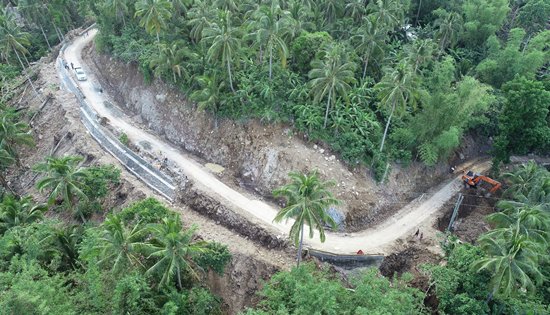
On-going
construction of road leading to Caanibongan Elementary
School, Brgy. Caanibongan, Cabucgayan, Biliran. |
By
DPWH-Biliran
April 30, 2021
NAVAL, Biliran –
The Department of Public Works and Highways (DPWH) Biliran District
Engineering Office (DEO) is implementing the construction of road
leading to Caanibongan Elementary School project in Cabucgayan town
that will benefit not only the learners but the entire residents of
Brgy. Caanibongan.
The P9.8-M road project
involves the construction of a 0.33-kilometer two lane road with a
5-meter width and a 0.2-meter thickness.
Situated in the hill top
of Cabucgayan town, District Engineer Ferdinand A. Briones revealed
that road safety features are also included in the project such as
the construction of road slope protection structure and concrete
barrier.
“From a narrow one lane
dilapidated concrete road, residents will enjoy a wider, better and
safer road when this project is completed,” said Briones.
Based on the 2015
population census, about 270 residents will benefit this road.
DE Briones reported that
the project which is under contract with QYT Construction and Supply
is now halfway complete with an accomplishment of 51.77% as of April
30, 2021.
From its start date on
February 16, 2021, this project is to be completed by July 15, 2021.
Eastern Visayas’
economy contracts by 7.6% in 2020
By
PSA-8
April 29, 2021
TACLOBAN CITY – The
economy of Eastern Visayas contracted by 7.6 percent in 2020 from
its 5.6 percent growth recorded in 2019. The total value of goods
and services in the region or the Gross Regional Domestic Product (GRDP)
declined to 433.4 billion pesos in 2020 from 469.3 billion pesos in
2019, resulting in 35.9 billion pesos economic loss during the
reference period.
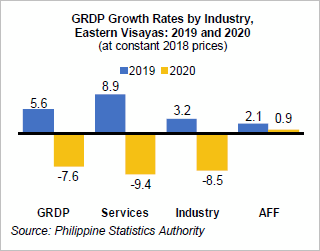 The economic contraction
in 2020 was driven by the declines in Construction, Transportation
and Storage, Wholesale and Retail Trade, Repair of Motor Vehicles
and Motorcycles, Accommodation and Food Service Activities (AFSA),
Real Estate and Ownership of Dwellings (REOD), Education, Other
Services (OS), Mining and Quarrying (MAQ), and Professional and
Business Services (PBS).
The economic contraction
in 2020 was driven by the declines in Construction, Transportation
and Storage, Wholesale and Retail Trade, Repair of Motor Vehicles
and Motorcycles, Accommodation and Food Service Activities (AFSA),
Real Estate and Ownership of Dwellings (REOD), Education, Other
Services (OS), Mining and Quarrying (MAQ), and Professional and
Business Services (PBS).
Services plunged to -9.4
percent in 2020 from 8.9 percent growth in 2019. Among its
industries, AFSA posted the largest contraction of 70.4 percent. The
following industries also dropped: Transportation and Storage
(40.2%); Other Services (19.3 %); Real Estate and Ownership of
Dwellings (11.6%); Trade (6.6%); Education (5.0%); and Professional
and Business Services (3.2%).
Industry declined by 8.5
percent in 2020 from 3.2 percent growth in 2019. Construction, and
Mining and Quarrying (MAQ) dropped by 34.2 percent and 26.8 percent,
respectively. On the other hand, the upbeat performance of
Manufacturing slightly mitigated the contraction of the economy
after posting 20.8 percent growth in 2020. Electricity, Steam, Water
and Waste Management likewise grew by 4.1 percent.
Meanwhile, Agriculture,
Forestry and Fishing (AFF) managed to grew by 0.9 percent in 2020
from 2.1 percent in 2019.
Services and Industry
shared the bulk of the region’s economy at 45.7 percent and 39.6
percent, respectively. AFF had a share of 14.8 percent.
Among the three (3) major
industries, Services and Industry contributed to the region’s
economic contraction with -4.4 percentage points and -3.4 percentage
points, respectively. AFF cushioned the decline at 0.1 percentage
point.
Army-PNPs
Darangpanan offers food to people in need
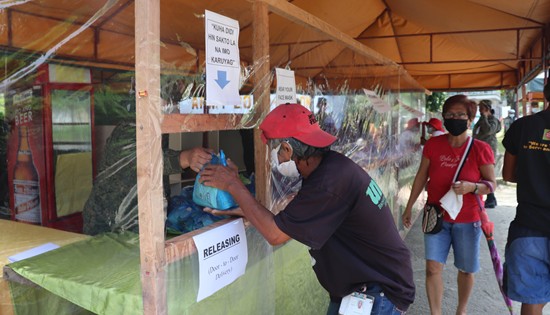
By
DPAO, 8ID PA
April 28, 2021
CAMP LUKBAN, Catbalogan
City, Samar – Selling chicharon or pork rind has been the source
of income of the 72-year old Anita Oliva. Despite her age, she
worked hard to provide food on the table. For months since the
Covid-19 pandemic began, her family has been struggling to make ends
meet.
“Akon mga anak damo
gihapon it mga anak salit kulang pa, may gin-atiman pod ako na
pag-umangkon na may kapansanan.” (My children also have many
children, so it’s not enough. I also provide the needs of my nephew
who has a disability.)
Seeing the need to
alleviate hunger, the soldiers of the 8th Infantry Division and the
police personnel of the Samar Police Provincial Office strengthen
the spirit of Bayanihan by setting up “Darangpanan” outside the 8ID
Headquarters, Catbalogan City, Samar.
Darangpanan is a venue
that provides food packs to families affected by the pandemic. Each
food pack contains rice, canned goods, noodles, eggs, sugar, coffee,
some fruits, and vegetables.
The 8th Infantry Division
Chief of Staff, Colonel Perfecto P. Peneredondo said the initiative
to help dubbed as the Kapwa Ko, Sagip Ko Program was made possible
by the help of kind-hearted Samareños who never cease to extend
their hand to the needy.
“It is this time of
difficulty that we see the spirit of Bayanihan among every Filipino
and how they willingly share a portion of what they have to those
who need it the most,” Colonel Penaredondo said.
One of those who were able
to receive goods is the15-year old Ryan Igdalino, who patiently fell
in line just to bring home something to share with his family at
home.
“Nakita ko kasi kung paano
nahihirapan ang mga magulang ko ngayon upang may mapakain lang sa
aming magkakapatid. Gusto kong tumulong kahit sa maliit na paraan,
sagot ko na po hapunan namin mamaya.” (I see how my parents struggle
just to provide food for me and my siblings. I want to help them
even in the smallest way, I am in charge of tonight’s dinner.)
Colonel Penaredondo added
that although they are delighted by the fact that many people
benefited from this activity, a feeling of sadness still lingers, as
there are still plenty of people who need help.
“May this initiative
inspire others to help, especially during these trying times. I am
also hoping that, with the help of some kind-hearted Samareños, this
could last long, especially now that a lot of individuals have
expressed their willingness to help the initiative.”
As of 3pm, April 26,
Darangpanan was able to provide food packs to 316 individuals.
CARD e-Doctor
marks Year One; served more than 30,000 individuals through online
consultation
By
CARD MRI
April 28, 2021
SAN PABLO CITY –
CARD Mutually Reinforcing Institutions (CARD MRI) through its
Microfinance and Health Protection (MaHP) unit launched CARD
e-Doctor in April 2020 to continuously provide online medical access
to clients during the COVID-19 pandemic.
Said MaHP Director Dr.
Roderick Belen, "We started this online platform because we saw an
opportunity to continuously reach CARD MRI clients and their
families amidst the pandemic. We realized at the onset of community
quarantines and lockdowns last year that access to medical support
will be gravely needed as we face this health crisis.”
After a year of conducting
online consultations, the program recorded a total of 34,756
consultations. Further, a total of 11 partner doctors were tapped,
specializing in internal and general medicine, obstetrics and
gynecology, pediatrics, dentistry, ophthalmology, and orthopedic
surgery.
"When they invited me to
this program, I never hesitated to join because helping other people
is my purpose in life. Being part of this initiative made it easier
for doctors like us to reach clients in the country and address
their medical concerns," said Internal Medicine Physician Dr.
Remedios Maligaya.
Aside from the online
consultation, CARD e-Doctor also became a venue for CARD MRI to
inform and educate the general public about current health issues
and concerns. "Before the pandemic, we regularly conducted
simultaneous weekly community health days (CHD) nationwide to
provide medical, optical and dental check-ups. The CHD also allowed
us to host physical forums to discuss various health topics. We
decided to transform these forums online to continue our advocacy of
raising awareness on health and wellness,” Dr. Belen shared. He
recalled that when CARD e-Doctor held its first live consultation,
the viewers reached more than 2,500 viewers nationwide. The first
topic discussed in this Live is COVID-19, its symptoms, and
preventive measures.
"From a total of 149
health topics that were discussed, we have reached 15,404 live
viewers throughout the country. As we continuously fight the
COVID-19, we are now embracing to adopt advanced technology in order
to cater more clients and their families," he concluded.
Like and follow CARD
e-Doctor official Facebook page to avail free online medical
consultations, watch health-related live discussions and know more
about the program.
DPWH-L2DEO
rehabilitates and widens roads along Palo-Carigara-Ormoc road
section
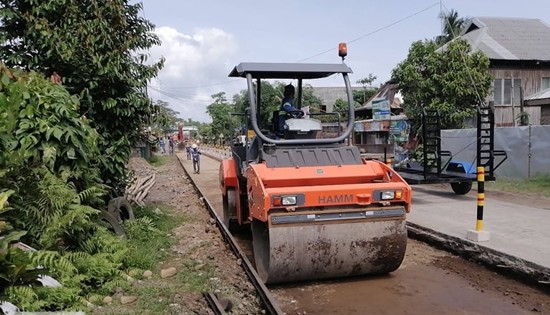
By
DPWH 2nd LED
April 27, 2021
CARIGARA, Leyte –
To increase the load capacity and improve the road condition along
the national highway, the Department of Public Works and Highways (DPWH)
-Leyte Second District Engineering Office allocates P121 million
covering road improvement, rehabilitation, widening, slope
protection structure and concrete drainage canal.
OIC-District Engineer Leo
Edward Oppura said these projects will be in the major road of Palo-Carigara-Ormoc
road section particularly in Jaro, Carigara and Capoocan areas.
“Road slope protection
will be installed in Brgy. Lemon, Capoocan, Leyte, while road in
some parts of Carigara & Jaro road section will be widened and
rehabilitated.” Oppura said.
DE Oppura calls to the
public affected by the road widening project to cooperate with the
government’s effort to improve the road network for better and
faster mobility of the motorists considering that Palo-Carigara-Ormoc
road section is one of the busiest roads in Leyte.
The P121-million is
composed of six (6) infrastructure project namely; Asset
Preservation Program-Preventive Maintenance-Primary Roads-Palo-Carigara-Ormoc
Road, K0958+123.67-K0958+413.00, K0958+534.35-K0958+827.40;
Asset Preservation
Program-Rehabilitation/Reconstruction/Upgrading of Damaged Paved
Roads-Primary Roads-Palo-Carigara-Ormoc Road, K0957+357-K0957+659;
Network Development Program-Road Widening-Primary Roads-Palo-Carigara-Ormoc
Rd. K0957+(-212)-K0957+347;
Asset Preservation
Program-Preventive Maintenance-Tertiary Road-Palo-Ormoc via Jaro
Poblacion Rd.-K0941+1144-K0941+1196, K0941+500-K0941+1144; Network
Development-Road Widening-Primary Roads, Palo-Carigara-Ormoc Road
K0940+910-K0941+442;
Asset Preservation
Program-Rehabilitation/Reconstruction of Roads with Slips, Slope
Collapse and Landslide-Primary Roads along Palo-Carigara-Ormoc Road
K0972+776.13-K0973+041.13.
Among these projects 4 are
on-going while the 2 projects are waiting for the modification
approval.
Barugo-San Miguel
road section undergoes road rehabilitation
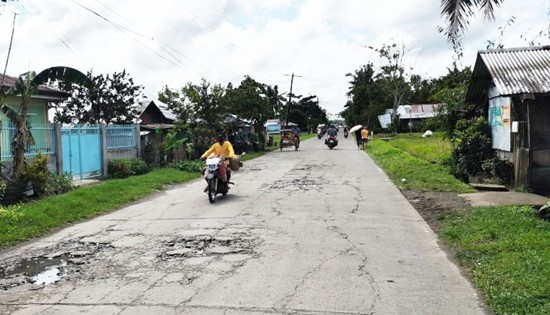
By
DPWH 2nd LED
April 26, 2021
BARUGO, Leyte –
Aiming to deliver a better road connectivity in the town of Barugo
and San Miguel in Leyte, the Department of Public Works and Highways
(DPWH) Leyte Second District Engineering Office works to improve
road network in these road sections.
The project involves
rehabilitation and improvement of intermittent section traversing
Poblacion District 4 to Barangay Calingcaguing in Barugo town
covering 5.19-lane kilometer.
“This is a vital road
considering that this road network serves as an alternative road for
motorists utilizing Palo-Carigara-Ormoc road section,” said OIC-District
Engineer Leo Oppura.
Barugo-San Miguel road
section is under the jurisdiction of the Provincial Government of
Leyte, connecting to the national road network. The Babatngon - San
Miguel road section is connected to Palo-Carigara-Ormoc road section
under Leyte First District Engineering Office. Meanwhile,
Bagahupi-Babatngon-Sta. Cruz-Barugo-Carigara road connects to Leyte
2nd District Engineering Office.
This road section had been
an alternate route to and from Tacloban, Ormoc, Biliran when the
Hiagsam Bridge along Palo-Carigara-Ormoc Road (Jaro road section)
was damaged due to severe flooding caused by typhoon Seniang in
December 2013, causing severe deterioration of the road pavement
thus immediate reconstruction is needed for the safety of the
travelling public.
Once completed, the
P43.808-million worth project will provide safer and convenient
travel of the motorists.
The rehabilitation project
commenced last April 12, 2021 and will be completed on or before
October 30, 2021 is part of the FY-2021 General Appropriation Act (GAA).
DPWH-Biliran DEO
starts construction of two diversion road projects

On-going
construction of Pawikan-Esperanza Diversion Road, Brgy.
Cabucgayan, Biliran. |
By
DPWH-Biliran
April 25, 2021
NAVAL, Biliran –
The Department of Public Works and Highways (DPWH) Biliran District
Office (DEO) has started the construction of two diversion road
projects in Biliran that will relieve traffic congestion in the main
highway of Naval and Cabucgayan towns.
District Engineer
Ferdinand A. Briones said that the projects are implemented at Sitio
Riverside to Brgy. Sto. Niño leading to Biliran Provincial Hospital,
Naval, Biliran and Brgy. Pawikan to Brgy. Esperanza, Cabucgayan,
Biliran.
The P47.4-M construction
of Naval Diversion Road which recently started involves the road
opening and concreting of 0.946-kilometer two-lane road and 6,338.20
sq.m. roadway slope protection and acquisition of Road-Right-Of-Way
(RROW).
According to Briones, the
said project is a multiyear project from year 2021-2022 with a total
appropriation amount of P80M.
“The completion of this
project by phases will relieve traffic congestion and provide
quality, safe, and direct access to the Provincial Hospital of
Biliran,” said Briones.
Meanwhile, DPWH-Biliran
DEO is also implementing the construction of its P9.9-M Pawikan-Esperanza
Diversion Road. This project involves opening and concreting of a
four-lane road with a length of 0.341-kilometer.
This is also a multiyear
project from year 2021- 2023 with a total allocation of P243-M. It
involves road opening and concreting of a four-lane roadway with a
total length of 4.658 kilometer and a construction of a four-lane,
20 ln.m. bridge and acquisition of ROW.
Briones said that the
project is prioritized in lieu of the road widening in the main
highway of Brgy. Baso, Brgy. Bunga, Brgy. Libertad, Brgy. Magbangon
and Brgy. Esperanza all in the town of Cabucgayan where many
residents will be affected.
“These diversion road
projects will not only help speed up the movement of people, goods
and services for economic development in the towns of Naval and
Cabucgayan, also it avoided the damages to the existing
establishments/ buildings that could have been incurred if road
widening projects were to be implemented on these areas,” said
Briones.
DTI helps protect
the environment through accredited Service and Repair Enterprises
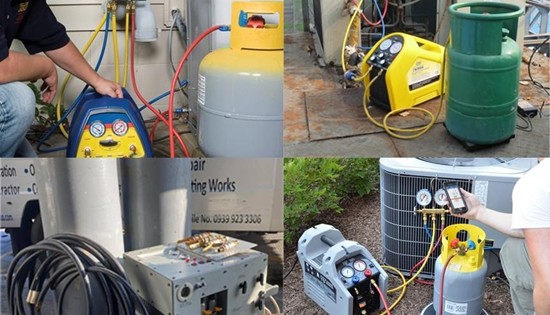
By
DTI-CPG-Fair Trade Enforcement Bureau
April 23, 2021
MAKATI CITY – The
Department of Trade and Industry - Fair Trade Enforcement Bureau
(DTI-FTEB), through the Business Licensing and Accreditation
Division (BLAD), accredits service and repair enterprises including
those that repair, service, install, and maintain refrigerator and
air conditioning (RAC) units, whether for household, commercial or
mobile (motor vehicle) purposes.
Department Administrative
Order No. 03, Series of 2006 requires these shops to have
refrigerant recovery machine to use in recovering refrigerants in
the A/C units to prevent the refrigerant from venting to the air
while being serviced or repaired. They are also required to have
non-disposable refrigerant cylinders/tanks, one for each type of
refrigerant to store the recovered refrigerants. Refrigerants are
known for having harmful effect on the environment since they have
global warming and ozone depletion potentials. Relative thereto, the
Department of Environment and Natural Resources (DENR) has a program
in the collection of these recovered refrigerants for proper
disposal.
Service and Repair Shop
Enterprises are also required to have technicians properly trained
and certified by the Technical Education and Skills Development
Authority (TESDA) and to submit copies of the relevant and valid
TESDA certificates as part of the accreditation requirements.
FTEB-BLAD conducts
validation inspection in the shop’s premises to verify the
application and to check the required tools and equipment including
the recovery machine. In 2019, the result of inspection showed that
several shops were found to have no recovery machines, as such were
endorsed to the FTEB Enforcement Division (ED) for issuance of
Notice of Violation (NOV) and filing of Formal Charge.
“We remind all Ref and
Air-conditioning SREs to submit proof of acquisition and a photo of
their recovery machine as evidence that they own or lease the said
equipment. New applicants, however, are to be inspected to ensure
and validate the presence of recovery machines in their respective
shop,” DTI-FTEB Director Ronnel O. Abrenica underscored.
Undersecretary for DTI -
Consumer Protection Group (CPG) Ruth B. Castelo also added that DTI
is one with DENR in protecting the environment and ensuring that
consumers are provided with fair and satisfactory service from Ref
and Air-conditioning service and repair shops and that sustainable
consumption is promoted and practiced as well.
The Ref and Aircon SREs is
the second among the most number of accredited SREs after Motor
Vehicle SREs.